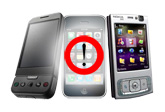 Cellphone owners now account for 88 percent of the U.S. population, of which some 43 percent say they download applications on their phones. Among these ‘app users,’ 57 percent told the Pew Internet and American Life Project that they have either uninstalled existing applications or made the decision to not install an application altogether after determining the amount of personal information required as a permission to install.
Cellphone owners now account for 88 percent of the U.S. population, of which some 43 percent say they download applications on their phones. Among these ‘app users,’ 57 percent told the Pew Internet and American Life Project that they have either uninstalled existing applications or made the decision to not install an application altogether after determining the amount of personal information required as a permission to install.
Broken down, 54 percent said they decided not to install apps while a further 30 percent uninstalled apps after the fact, according to the nationwide Pew survey of 2,254 adults.
Of the surveyed cell phone owners, 42 percent back up the contents of their mobile devices, 32 percent cleared browsing history, and 19 percent disabled location tracking. All of these figures increase when limited exclusively to smartphone owners, and there is an inverse correlation between these percentages and age.
Nearly a third of cell phone users surveyed claimed that they had experienced a lost or stolen phone. Beyond that, 12 percent claimed that another person had accessed their phone in a way that constituted a violation of privacy. Among respondents between the ages of 18 and 24, 45 percent claimed to have experienced a lost or stolen device and 24 percent said others had accessed their phones in ways that they considered violations of their privacy. In these categories there was no significant difference between users of smartphone and users of regular cell phones.
Demographic differences in the survey were scant, but Pew did report that male app users were more likely to uninstall apps that shared too much of their personal information. Both genders responded in similar numbers with regards to avoiding overly intrusive applications outright. App users with some college education were more likely to avoid apps than were those without.
There was no significant difference in attitude between respondents allied with Apple’s iPhones or Google’s Android.









